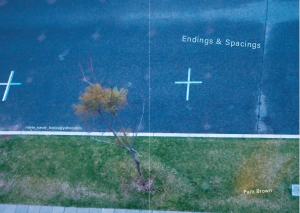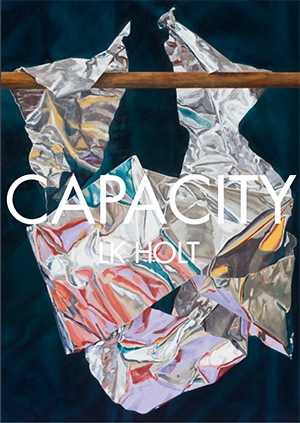Poetry
Felicity Plunkett reviews 'Such Color: New and selected poems' by Tracy K. Smith
‘The wave always returns’, writes Marina Tsvetaeva. And it ‘always returns as a different wave’. Such Color reveals such a relentless renewal of lyricism as a signature of Tracy K. Smith’s poetry. A selected edition promises to highlight images and ideas across the American poet’s work. For Smith, one constant is the movement of water. In ‘Minister of Saudade’, from her second collection, Duende (2007), the speaker asks: ‘What kind of game is the sea?’ After a pause at the stanza break, an incantatory reply comes: ‘Lap and drag. Crag and gleam. / The continual work of wave / And tide.’ Ceaseless making, flux, and patterning are also a poem’s work. Smith’s image of creative marine energy recalls Sylvia Plath’s image of words’ ‘indefatigable hooftaps’, echoing as they carry meaning outwards. In Plath’s case, as in Smith’s, one direction is seawards.
... (read more)Abigail Fisher reviews 'Endings & Spacings' by Pam Brown and '>>> & || (accelerations and inertias)' by Dan Disney
‘Endings & Spacings’ opens with a confession: after several decades of ‘making connections / through strings of words’, Pam Brown is no closer to answering the question, ‘what does a poet / do’? In interviews, Brown tends to describe writing poetry as a kind of ‘benign compulsion’, an engagement with the world that must be critical to be interesting but that ‘can’t answer questions any better than anything else’, as she asserted in Meanjin in 2001 and has resolutely maintained ever since. In her latest collection, Endings & Spacings, even this benign compulsion – ‘dwindling now’ – comes under threat, its benignity troubled by the resemblance between arranging lines on the page and the curation of fragments in a virtual ‘museum / of imperial plunder’.
... (read more)Prithvi Varatharajan reviews 'Dropbear' by Evelyn Araluen and 'TAKE CARE' by Eunice Andrada
There is a moment of reflexivity in Evelyn Araluen’s diary poem ‘Breath’, in which the poet, thousands of kilometres away, follows news reports of bushfires ravaging Australia, including the Dharug Country where she grew up. ‘I’ve started a book which seeks to tease the icons of Australiana that have been so volatile to this country. They, too, are burning,’ she writes. Several reviewers have focused on this dimension of Araluen’s début. Dropbear contains many poems that excoriate the tropes of colonial literary kitsch. This genre takes native vegetation and wildlife, and Aboriginal people, and transforms them into the cute, the twee, or the fearsome. Dropbear responds to May Gibbs’s Snugglepot and Cuddlepie, Dorothy Wall’s Blinky Bill and Nutsy, D.H. Lawrence’s Kangaroo, and Banjo Paterson’s poems and diaries, among other texts and films. In a scholarly essay (2019) that addresses the legacy of Edward Said’s Orientalism, Araluen has argued that we still underestimate ‘literature’s power to operate as a force of imperialism’. For the Bundjalung poet and academic, the personal in poetry is inseparable from the political – as well as from the historical and the literary-historical.
... (read more)Joan Fleming reviews 'Capacity' by LK Holt and 'Theory of Colours' by Bella Li
These days, poetry is primarily a visual experience. So claims the American poet and theorist Cole Swensen, whose essay ‘To Writewithize’ argues for a new definition of ekphrasis. Traditionally understood to be writing about visual art, ekphrasis typically has a poet stand across from a painting or sculpture, in a kind of face-off, and write about it. To ‘writewithize’, however, is to take a different approach: this is not writing made about art but made with it. This is writing that, in Swensen’s words, ‘lives with the work and its disturbances’. Two new Vagabond releases by Bella Li and LK Holt are doing ekphrastic and intertextual work that is exquisitely disturbing. These are moody books of allusion and visual play by two of Melbourne’s most brilliant poets.
... (read more)New poetry collections by Jazz Money, Ann Vickery, and Lucy Van
Good poetry uncovers the secret in the manifest, and the manifest in the secret. Three new collections throw this paradox into vibrant, unsettling relief. Each book deserves a broad readership. Each beats back the lethargic thinking that has invaded society under the cover of the pandemic.
... (read more)David Mason reviews 'How to Read a Poem: Seven steps' by Thomas H. Ford
In my thirty years as an academic, the greatest joy and puzzlement I had was in teaching poetry. I agree with T.S. Eliot that ‘genuine poetry can communicate before it is understood’. Our best teaching often involves what we do not fully understand. The scholar D.S. Carne-Ross once argued that, upon hearing poetry spoken in an unfamiliar language, you can tell it is poetry, the language of poetry, which is other than what I do in writing this review. Anyone faced with the problem of teaching poetry in an academic setting will realise that part of the problem is the academic setting itself. Poetry has thrived for millennia everywhere on earth without the benefit of professors, classrooms, and theories of reading. How, then, might we teach it?
... (read more)New poetry collections by Anne Elvey, D.J. Huppatz, and Young Dawkins
I was surprised by the title of Melbourne-based Anne Elvey’s recent collection, Obligations of Voice (Recent Work Press, $19.95 pb, 89 pp). Though quite a mouthful, it’s bravely deliberate; Elvey wants you to slowly voice and feel the syllables. Several poems centre on the mouth or lips for political, theological, even surrealist ends. The poem ‘Afternoon Tea, Seaford Beach Café’ begins with the line ‘A woman stands’. Floating in the right margin is the phrase ‘at the back of a throat’. These fragments coalesce to describe the woman’s mouth or the mouth she’s lodged in. Breathing and ‘charcoal’ gums are collaged with the ‘Dark // corrugations’ and the landscape of the sea. The last line surprises by changing tack: ‘A skiff // bounces on a swell.’ This clipped linguistic dexterity, with a flash of painterly movement, characterises Elvey’s nuance and facility.
... (read more)Geoff Page reviews 'Letters from the Periphery' by Alex Skovron
To those who have followed Alex Skovron’s poetry since The Rearrangement (1988), it’s not a surprise to learn that he has been the general editor of an encyclopedia, a book editor, a lover of classical music and chess, an occasional translator of Dante and Borges, and the author of six well-spaced poetry collections, a stylish novella, and a collection of short stories. He can often seem the very embodiment of the European/Jewish/Melburnian intellectual (despite an adolescence spent in Sydney).
... (read more)David McCooey reviews 'Fishing for Lightning: The spark of poetry' by Sarah Holland-Batt
Sarah Holland-Batt’s Fishing for Lightning is a book about Australian poetry. As such, it is a rare, and welcome, bird in the literary ecology of our country. It is welcome because poetry, like any other art form, requires a supportive culture that educates and promulgates. Not that Holland-Batt, herself one of our leading poets, is ‘merely’ didactic, or a shill for the muses. Holland-Batt, who is also an academic, writes with great authority and insight, and she is a fine stylist, penning essays that are packed with humour and playfulness. These essays cater for all kinds of audiences, from newcomers to poetry experts, which is no small feat.
... (read more)Jennifer Harrison reviews 'Whirlwind Duststorm' by John Hawke
In the epigraph to this collection, a quote from Jean-Paul Sartre on Edmund Husserl suggests that we are entering a poetic that challenges the possibility of conscious knowledge; consciousness is itself a maelstrom that extrudes the intruder and has ‘no inside’. What follows is both a refutation and embracement of this assertion in chatoyant language that is as thoughtful and melodic as it is powerful. The reader is obliged to work hard to navigate the narrative, and I have rarely read poetry where the search for meaning has been felt so deeply.
... (read more)







